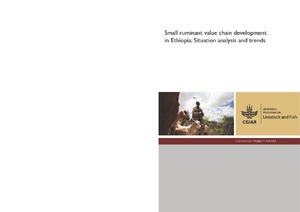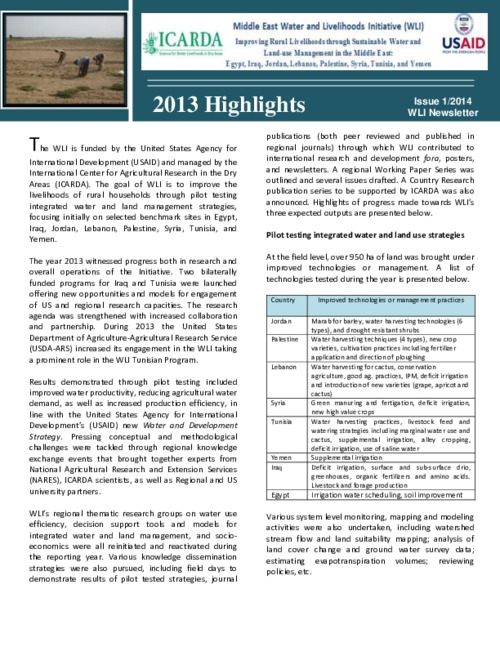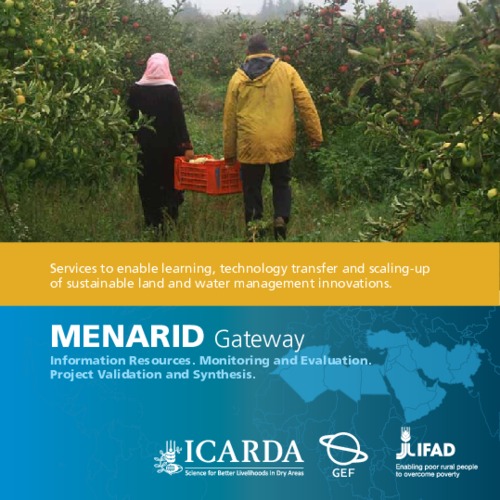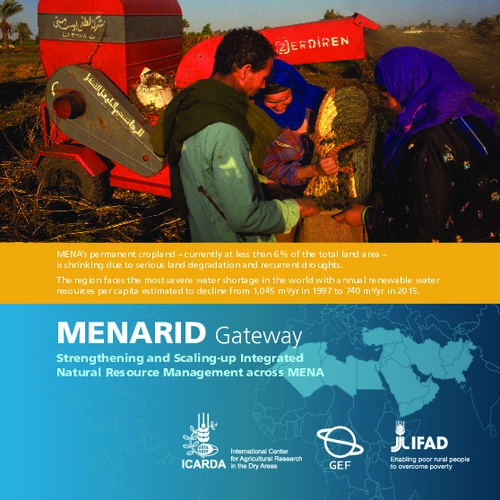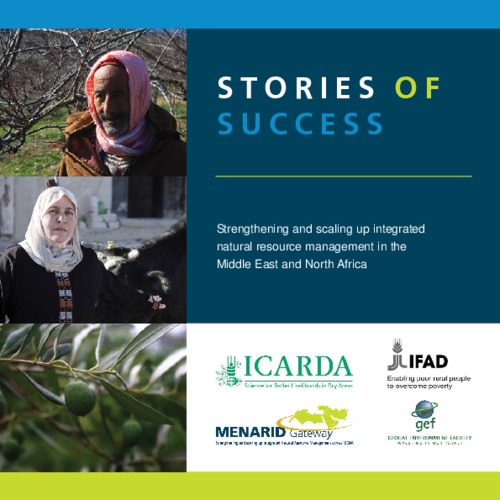Location
The International Center for Agricultural Research in the Dry Areas (ICARDA) was established in 1977. It is one of 15 such centers supported by the CGIAR. ICARDA’s founding mandate to promote agricultural development in the dry areas of developing countries remains highly relevant today.
ICARDA works with a tight focus on the problem-solving needs of resource-poor farmers, achieving this through the in-field delivery of its research outputs. Although global food production has increased by 20 per cent in the past decade, food insecurity and poverty remain widespread, while the natural resource base continues to decline.
International research centers such as ICARDA, which have helped drive previous improvements, continue to deliver new technologies to support sustainable growth in agriculture, and crucially, to work with a wide range of partners to accelerate the dissemination of these technologies.
ICARDA’s biggest strength is its staff – 600 highly skilled men and women from 32 countries. Our research and training activities cover crop improvement, water and land management, integrated crop-livestock-rangeland management, and climate change adaptation.
Other interventions include:
- Water harvesting - supplemental irrigation and water-saving irrigation techniques
- Conservation agriculture methods to reduce production costs and improve sustainability
- Diversification of production systems to high-value crops – horticulture, herbal and medicinal plants
- Integrated crop/rangeland/livestock production systems including non-traditional sources of livestock feed
- Empowerment of rural women – support and training for value-added products.
The ICARDA genebank holds over 135,000 accessions from over 110 countries: traditional varieties, improved germplasm, and a unique set of wild crop relatives. These include wheat, barley, oats and other cereals; food legumes such as faba bean, chickpea, lentil and field pea; forage crops, rangeland plants, and wild relatives of each of these species.
ICARDA’s research portfolio is part of a long-term strategic plan covering 2007 to 2016, focused on improving productivity, incomes and livelihoods among resource-poor households.
The strategy combines continuity with change – addressing current problems while expanding the focus to emerging challenges such as climate change and desertification.
We work closely with national agricultural research systems and government ministries. Over the years the Center has built a network of strong partnerships with national, regional and international institutions, universities, non-governmental organizations and ministries in the developing world and in industrialized countries with advanced research institutes.
THE ‘DRY AREAS’
Research and training activities cover the non-tropical dry areas globally, using West Asia, North Africa, Central Asia and the Caucasus as research platforms to develop, test, and scale-out new innovations and policy options.
Dry areas cover 41 per cent of the world’s land area and are home to one-third of the global population. About 16 per cent of this population lives in chronic poverty, particularly in marginal rainfed areas. The dry areas are challenged by rapid population growth, frequent droughts, high climatic variability, land degradation and desertification, and widespread poverty. The complex of relationships between these challenges has created a "Poverty Trap."
Members:
Resources
Displaying 301 - 305 of 431Small ruminant value chain development in Ethiopia: Situation analysis and trends
WLI Newsletter: 2013 Highlights
The year 2013 witnessed progress both in research and overall operations of the Initiative. Two bilaterally funded programs for Iraq and Tunisia were launched offering new opportunities and models for engagement of US and regional research capacities. The research agenda was strengthened with increased collaboration and partnership. During 2013 the United States Department of Agriculture-Agricultural Research Service (USDA-ARS) increased its engagement in the WLI taking a prominent role in the WLI Tunisian Program.
Services to enable learning, technology transfer and scaling-up of sustainable land and water management innovations.
The Menarid Knowledge Management initiative offers three services that will improve the effectiveness and wider use of IFAD projects – and potentially other rural development initiatives active in sustainable land and water management.
MENARID Gateway: Strengthening and Scaling-up Integrated Natural Resource Management across MENA
MENA’s permanent cropland – currently at less than 6% of the total land area – is shrinking due to serious land degradation and recurrent droughts. The region faces the most severe water shortage in the world with annual renewable water resources per capita estimated to decline from 1,045 m3/yr in 1997 to 740 m3/yr in 2015.
Stories of success: Strengthening and scaling up integrated natural resource management in the Middle East and North Africa
This document is a synthesis of outcomes from a knowledge process that was a collaborative effort involving researchers, scientists, and technicians from Iran, Jordan, Morocco, Tunisia, and Yemen.



